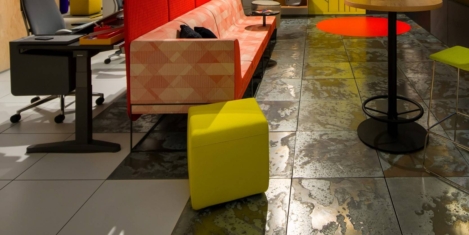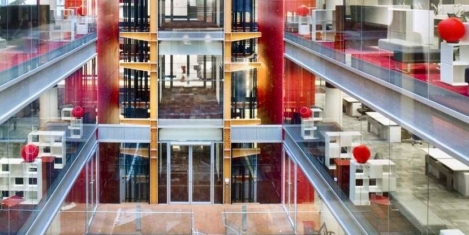To provide the best experiences, we use technologies like cookies to store and/or access device information. Consenting to these technologies will allow us to process data such as browsing behaviour or unique IDs on this site. Not consenting or withdrawing consent, may adversely affect certain features and functions.
The technical storage or access is strictly necessary for the legitimate purpose of enabling the use of a specific service explicitly requested by the subscriber or user, or for the sole purpose of carrying out the transmission of a communication over an electronic communications network.
The technical storage or access is necessary for the legitimate purpose of storing preferences that are not requested by the subscriber or user.
The technical storage or access that is used exclusively for statistical purposes.
The technical storage or access that is used exclusively for anonymous statistical purposes. Without a subpoena, voluntary compliance on the part of your Internet Service Provider, or additional records from a third party, information stored or retrieved for this purpose alone cannot usually be used to identify you.
The technical storage or access is required to create user profiles to send advertising, or to track the user on a website or across several websites for similar marketing purposes.
 The research-driven Workplace Trends Spring Summit returns for 2019. We have two sessions with invited guest speakers, our keynote and the after lunch debate. Following a recent Call for Abstracts and a blind peer review by our two moderators for the day, Nigel Oseland (Workplace Unlimited) and Mark Eltringham (Workplace Insight), the remaining sessions have now been filled with the highest ranked submissions.
The research-driven Workplace Trends Spring Summit returns for 2019. We have two sessions with invited guest speakers, our keynote and the after lunch debate. Following a recent Call for Abstracts and a blind peer review by our two moderators for the day, Nigel Oseland (Workplace Unlimited) and Mark Eltringham (Workplace Insight), the remaining sessions have now been filled with the highest ranked submissions.





 More than half of CEOs (53 percent) admit they can’t find candidates with the necessary skills to help them navigate an increasingly digitalised business landscape a new survey from Robert Half has claimed. These include data analysis and digital skills, as well as softer skills such as resilience, adaptability to change and critical thinking. This means that nearly five million UK SMEs, the equivalent to four out of every five (82 percent) small and medium-sized companies, are struggling to attract the skills they need. As a result, many are being forced to offer salary packages higher than originally expected to recruit the right talent.
More than half of CEOs (53 percent) admit they can’t find candidates with the necessary skills to help them navigate an increasingly digitalised business landscape a new survey from Robert Half has claimed. These include data analysis and digital skills, as well as softer skills such as resilience, adaptability to change and critical thinking. This means that nearly five million UK SMEs, the equivalent to four out of every five (82 percent) small and medium-sized companies, are struggling to attract the skills they need. As a result, many are being forced to offer salary packages higher than originally expected to recruit the right talent. 














 Organisations are taking serious security risks by allowing employees to access workplace IT systems remotely while on their summer holiday, a telecoms company has warned. According to research by the corporate IT and cyber-security arm of Deutsche Telekom, nearly a third of employees (31 percent) use free Wi-Fi hotspots, and nearly a quarter (24 percent) use them for work-related emails and documents. These are a big danger area as they are insecure and easy for hackers to clone (getting access to all email and web traffic, including any work documents and passwords). It also warns that 28 percent of employees email work documents to and from their personal email, despite this creating numerous security problems. Ten percent use free USB charging points at airports and stations; and these ports can be used to transfer viruses and malware to unsuspecting users. The blame cannot solely be placed on the employees though, as just 28 percent of employees have never in their working career had any cyber security training to protect themselves and their employer.
Organisations are taking serious security risks by allowing employees to access workplace IT systems remotely while on their summer holiday, a telecoms company has warned. According to research by the corporate IT and cyber-security arm of Deutsche Telekom, nearly a third of employees (31 percent) use free Wi-Fi hotspots, and nearly a quarter (24 percent) use them for work-related emails and documents. These are a big danger area as they are insecure and easy for hackers to clone (getting access to all email and web traffic, including any work documents and passwords). It also warns that 28 percent of employees email work documents to and from their personal email, despite this creating numerous security problems. Ten percent use free USB charging points at airports and stations; and these ports can be used to transfer viruses and malware to unsuspecting users. The blame cannot solely be placed on the employees though, as just 28 percent of employees have never in their working career had any cyber security training to protect themselves and their employer.















January 4, 2019
Why new technology can still make employees happier, healthier and more efficient
by Elaine Rossall • Automation, Comment, Flexible working, Lighting, Technology, Wellbeing
For many years, we became used to new technology being treated with excitement. Essentially, people thought technology made their lives better. More recently this consensus has been tested. On a very practical level, there is growing concern about the impact of everyday technology. ‘Screen-time’ has become a byword for anxiety and disengagement from the real world. Meanwhile, there is trepidation about the impact of future technology, such as the automation of jobs. Whilst caution is needed, there is a danger that we are forgetting the many benefits technology can bring. As an example, look to the workplace. Already, offices are gaining hugely from technology that benefits employee wellness and productivity. However, we have only just begun to feel its impact. A ‘fast’ office may sound like an oxymoron. A building isn’t going to win a 100-metre race. Yet fast offices, which allow employees to control their immediate environment, are becoming increasingly common.
More →